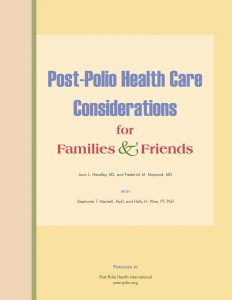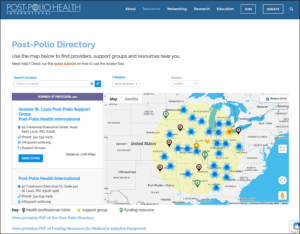Resources for Caregivers of Polio Survivors
Caregivers play a vital role in supporting the health, independence, and quality of life of people who live with the late effects of polio. Whether you are a family member, friend, or professional providing assistance, understanding the unique needs and experiences of polio survivors is essential to providing effective, respectful care.
Post-Polio Health International (PHI) recognizes that caregiving can bring both fulfillment and challenges. The needs of survivors may change over time—sometimes gradually, sometimes suddenly—and caregivers often find themselves learning new skills, adapting home environments, and coordinating medical and community services. In addition to meeting the physical and emotional needs of the survivor, caregivers must also attend to their own well-being to sustain this vital role over the long term.
This section of our website brings together information, tools, and perspectives to support caregivers in every stage of their journey. You’ll find guidance on managing daily activities and assistive technology, understanding post-polio syndrome and respiratory care, finding respite and peer support, and accessing trusted medical and community resources.
PHI is committed to equipping caregivers with accurate, practical information and fostering a community of shared knowledge and understanding. We hope these resources help you feel more confident, connected, and supported in the important work you do.
Post-Polio Health Care Considerations for Families and Friends
 This comprehensive guide from Post-Polio Health International was created to help families and friends understand the unique health and emotional needs of people who had polio. As many survivors age, loved ones often find themselves navigating unfamiliar territory—trying to distinguish between normal aging and the late effects of polio, or advocating for appropriate medical care when health professionals may have limited knowledge of the condition.
This comprehensive guide from Post-Polio Health International was created to help families and friends understand the unique health and emotional needs of people who had polio. As many survivors age, loved ones often find themselves navigating unfamiliar territory—trying to distinguish between normal aging and the late effects of polio, or advocating for appropriate medical care when health professionals may have limited knowledge of the condition.
Developed with input from expert clinicians and polio survivors, this resource offers clear, practical information on a wide range of topics: hospitalization, post-polio syndrome, daily health management, respiratory and swallowing issues, emotional well-being, and long-term care planning. It also addresses the changing roles within families, helping caregivers balance support and independence while ensuring continuity of care.
Funded by The Phyllis and Max Reynolds Foundation and The Chervenak-Nunnallé Foundation, Post-Polio Health Care Considerations for Families and Friends remains one of PHI’s most trusted and enduring resources for those seeking to provide knowledgeable, compassionate care.
Sustainable Caregiving
This PHI Town Hall was presented by Theresa Wilbanks, a writer, speaker, podcast host, Certified Caregiving Consultant, and founder of Sustainable Caregiving. She is the author of Navigating the Caregiver River: A Journey to Sustainable Caregiving. Her podcast series, “Self-Caregiving Strategies,” exploring her 12 Sustainable Caregiving Strategies is available on her website, sustainablecaregiving.com.
The Post-Polio Directory
 PHI’s Post-Polio Directory is a trusted, continually updated guide to professionals and organizations serving the polio community. The Directory lists health care providers with experience treating the late effects of polio, local and regional support groups, and funding resources that assist with medical and adaptive equipment. Whether you are a polio survivor, caregiver, or clinician, the Directory offers a practical starting point for finding knowledgeable support and community connections worldwide.
PHI’s Post-Polio Directory is a trusted, continually updated guide to professionals and organizations serving the polio community. The Directory lists health care providers with experience treating the late effects of polio, local and regional support groups, and funding resources that assist with medical and adaptive equipment. Whether you are a polio survivor, caregiver, or clinician, the Directory offers a practical starting point for finding knowledgeable support and community connections worldwide.
